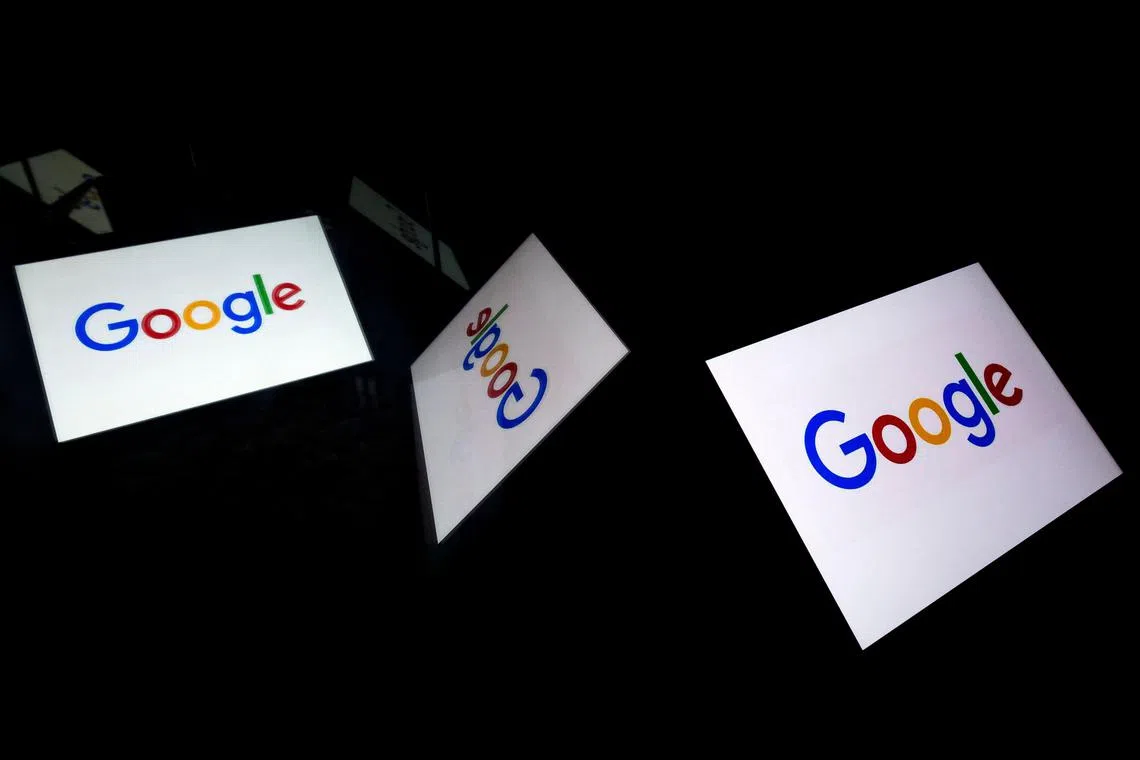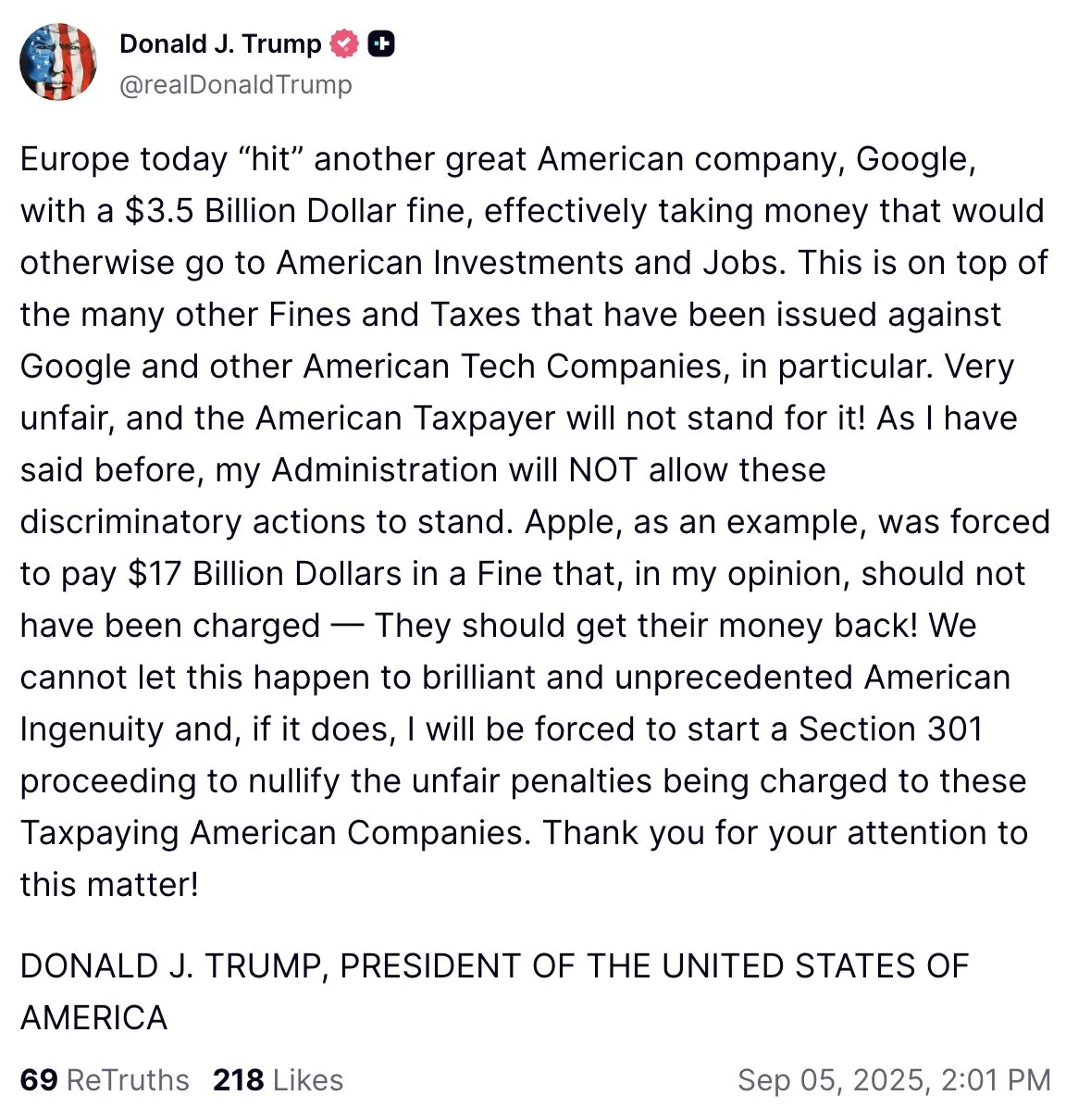Google hit with $4 billion EU antitrust fine over adtech practices
Sign up now: Get ST's newsletters delivered to your inbox

The €2.95 billion (S$4.4 billion) fine is the fourth penalty Google has faced in its decade-long fight with EU competition regulators.
PHOTO: AFP
- The EU fined Google €2.95 billion for anti-competitive practices in its adtech business, favouring its own services and disadvantaging rivals.
- Donald Trump criticised the fine as "unfair," threatening retaliation via Section 301 of the Trade Act, while Google plans to appeal the decision.
- The EU demands Google address its conflicts of interest or face stronger remedies, potentially including divestiture, to ensure fair digital markets.
AI generated
BRUSSELS - Alphabet’s Google was hit with a €2.95 billion (S$4.4 billion) EU antitrust fine on Sept 5 for anti-competitive practices in its lucrative adtech business, a sharp sanction against the firm that riled up US President Donald Trump.
The fine, the fourth penalty Google has faced in its decade-long fight with EU competition regulators, comes amid bubbling trade tensions between major global powers and US threats of retaliation over EU scrutiny of American tech firms.
Mr Trump said in a post on Truth Social that the action was “unfair” and “discriminatory”.
“We cannot let this happen to brilliant and unprecedented American Ingenuity and, if it does, I will be forced to start a Section 301 proceeding to nullify the unfair penalties being charged to these Taxpaying American Companies,” Mr Trump said.
Section 301 of the Trade Act of 1974 allows the US to penalise foreign countries that engage in acts that are “unjustifiable” or “unreasonable”, or burden US commerce.
The move by the European Commission was triggered by a complaint from the European Publishers Council.
Mr Trump, who has hit Europe with trade tariffs, has threatened to retaliate against the European Union for any pushback against Big Tech.
While Google plans to appeal, the commission has warned of stronger remedies – including potential divestitures – if the company fails to address its conflicts of interest.
The case underscores growing transatlantic friction over digital market regulation and the EU’s push to rein in dominant platforms.
The EU competition enforcer had originally planned to hand out the fine on Sept 1, but opposition from EU trade chief Maros Sefcovic on concerns about the impact of US tariffs on European cars derailed EU antitrust chief Teresa Ribera’s plan.
The commission said Google favoured its own online display technology services that reinforced its own ad exchange AdX’s central role in the adtech supply chain and allowed Google to charge high fees for its service, to the detriment of rivals and online publishers.
Google abused its market power since 2014 until today, the EU watchdog said.
It ordered Google to stop the self-preferencing practices and take measures to cease its inherent conflicts of interest. The company has 60 days to inform the commission how it plans to comply with this order, and another 30 days to do so. The commission reiterated its preliminary view that Google should divest part of its services but said it wants to first hear and assess Google’s compliance efforts, confirming a 2024 Reuters story.
“Google must now come forward with a serious remedy to address its conflicts of interest, and if it fails to do so, we will not hesitate to impose strong remedies,” Ms Ribera said in a statement.
“Digital markets exist to serve people and must be grounded in trust and fairness. And when markets fail, public institutions must act to prevent dominant players from abusing their power,” she said.

US President Donald Trump voiced his displeasure with Europe’s fine in a Truth Social post.
SCREENSHOT: X
‘We will appeal’
Google criticised the EU decision and said it would challenge it in court.
“The European Commission’s decision about our ad tech services is wrong and we will appeal. It imposes an unjustified fine and requires changes that will hurt thousands of European businesses by making it harder for them to make money,” Ms Lee-Anne Mulholland, vice-president, global head of regulatory affairs, said in a statement.
“There’s nothing anticompetitive in providing services for ad buyers and sellers, and there are more alternatives to our services than ever before,” Ms Mulholland said.
The latest fine compared with a record €4.3 billion penalty handed out to Google in 2018, €2.42 billion in 2017 and €1.49 billion in 2019.
Reuters reported last week that the fine would be modest, marking a change in Ms Ribera’s approach with her predecessor’s deterrent hefty fines.
The European Publishers Council lamented the absence of a breakup order.
“A fine will not fix Google’s abuse of its adtech,” its executive director, Ms Angela Mills Wade, said.
“Without strong and decisive enforcement, Google will simply write this off as a cost of business while consolidating its dominance in the AI era, perpetuating unfair competition and weakening news media and publishing companies which rely on advertising revenues,” she said.
Ms Cori Crider, senior fellow at Future of Tech Institute and an honorary professor at UCL Laws, urged the commission to take a drastic step with a breakup order.
“Europe made an important stand for the rule of law today by pressing ahead with this first-step fine in the face of Trump and Big Tech’s bullying,” she said.
“But I want to be clear: only a break-up will fix Google’s monopoly, unlock this €120 billion market for European business, and save our dying media sector.”
Google is scheduled to go to trial in the US on Sept 22 to determine remedies in a separate case brought by the US Justice Department, where a judge found the company holds illegal monopolies in online advertising technology.
Google’s 2024 advertising revenue, including from search services, Gmail, Google Play, Google Maps, YouTube, Google Ad Manager, AdMob and AdSense, amounted to US$264.6 billion (S$340 billion) or 75.6 per cent of total revenue. It is the world’s dominant digital-advertising platform.
Google does not provide revenue figures for its adtech business, which relates to advertising on other websites and not search ads. REUTERS


